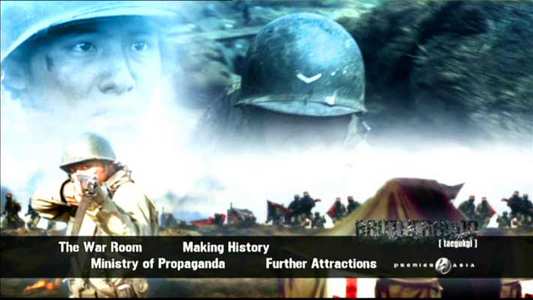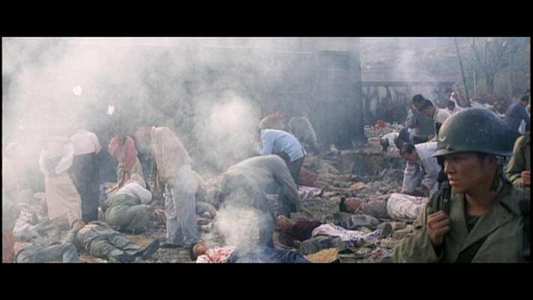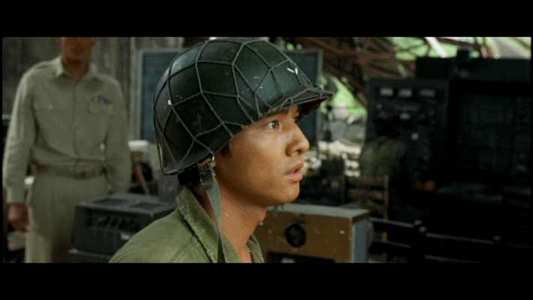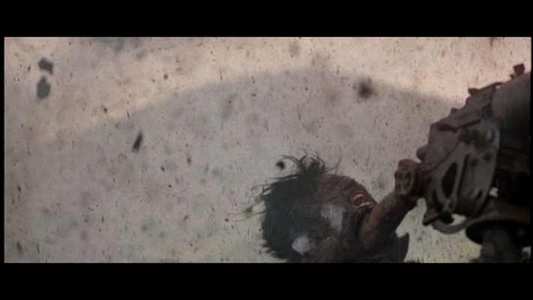Review of Brotherhood
Introduction
After the Second World War, the globe settled uneasily into what would come to be known as the Cold War. After the Japanese surrender, Soviet forces to the North and US forces to the south occupied Korea, with both sides setting up communist and democratic governments respectively. In 1947 when both sides withdrew, there was a failure to re-unite the two sides, and the matter was turned over to the fledgling United Nations. Setting a familiar precedent, the UN failed to resolve the situation and in 1950 at the urging of the Soviet Union, North Korea invaded the South, rapidly overwhelming them. The UN Security Council voted in emergency session to authorise a `police action` to halt the invasion. Enter General Douglas MacArthur, who cut off the lines to the North Korean forces and captured over 125,000 of them. Pushing back to the original peacetime border, most of South Korea was quickly liberated and it looked as if the allies would continue on into North Korea to reunify the country on their terms. This rattled the Chinese, who thought this would be a prelude to an attack on their territory and they immediately sent 180,000 volunteers into North Korea who pushed the UN forces back once again to the original border. And so matters remained for another three years, burning slowly as both sides fought over a border that showed no signs of shifting. By the time there was an armistice, 5 million people had died, and the pattern was set for countless ideological brush wars all over the world.
The Korean War rarely features in Western cinema, especially in recent years, with only the movie and subsequent television series M*A*S*H springing to mind. The same certainly isn`t true of Korean cinema however. Quite naturally, a recent war and a divided nation must be a fundamental part of the national identity. With the recent growth in the Korean film industry, the production values of Hollywood blockbusters can be applied to homegrown films. Brotherhood was made in 2004, and brings the visual style and gritty realism of Spielberg`s Saving Private Ryan to a story far more poignant to Korean audiences.
The story synopsis above is more than detailed enough, and I won`t bother repeating it here. I received the rental disc of the film to review, as well as the extras disc from the retail release, so I`m missing out on some soundtracks and a commentary.

Video
An outstanding 2.35:1 anamorphic transfer shows off this film to exquisite effect. The image is uniformly clear and sharp throughout, with all detail reproduced well. This is an epic film, bringing to life 1950`s Korea with a stunning degree of clarity and style. The palette for the pre-war sequences is a rich gold, signifying peaceful and more innocent days, but once the war starts, the antagonists are thrown into a gritty and realistic setting.
Director Je-gyu Kang takes a leaf out of Saving Private Ryan for this film, the battle sequences are noisy and brutal, the camera shakes and reels in a handheld hyper-real documentary style and the film pulls no punches when it comes to showing the horrific violence both sides inflict on each other. This is a film much bigger than its budget, with large open vistas, expansive battle sequences, and scenes with thousands of extras in. In every way it tries to recapture the events of the Korean War and bring it to the screen in as visceral a way as possible, and it very nearly succeeds. The only time the budget shows is when some plasticky looking CGI planes enter the frame. Thankfully it doesn`t happen too often, but when it does it`s quite jarring.

Audio
The rental disc I received had only a DD 5.1 Korean soundtrack with English subtitles. But what a soundtrack! If you want your battle sequences to test your speakers` limits, with gunfire and explosions spewing from liberally around the soundstage, then Brotherhood is certainly up there for percussive action. Despite this, the dialogue remains clear, and the film is graced with a majestic and moving score. With the retail disc, there are DD 5.1 and DTS soundtracks in Korean to look forward to.
ADDENDUM: It has been brought to my attention that contrary to what is stated on the DVD cover, as well as the pre-release information, there are no English soundtracks with this release. You should bear that in mind when deciding to buy this disc.

Features
Had I received the retail disc, no doubt I would be telling you about another information packed audio commentary from Bey Logan and Mike Leeder. Instead I move swiftly on to…
Disc 2
The second disc is presented with some nicely animated menus, leading me to believe that the retail version of the first disc will be similarly presented. The featurettes are separated into three sections.
The War Room contains Battle Plans, which has 11 minutes of storyboards presented side by side with key scenes from the film. Special Operations lasts 12 minutes and gathers interviews with the director and producers, talking about the inspiration for the film, the background and the message they hoped to convey. Honoured Dispatches, lasts 15 minutes and look at the financial side of the film, budgeting for and making an epic film on an independent budget. Captain`s Orders is presented anamorphically unlike the other extras and lasts 20 minutes. It looks at the action in the film, the training the actors received and the special effects. It`s an amazing contrast between Hollywood and Korea as Jung Doo-Hung explains; Brotherhood was completed on a budget of £7.5 million. He also confides that while the camera shake and wobble in Saving Private Ryan was put in to convey a realistic documentary style, in Brotherhood it serves to hide a lack of extras, or a sparse background.
Making History gathers together the featurettes on the making of the film. History Through The Lens lasts 18 minutes and examines the look and setting of the film, with input from the Director Of Photography, the Art Director, the Special and Visual Effects Supervisors and the Music Director. Brotherhood also lasts 18 minutes and the actors talk about making the movie and the casting process. Tears Of Fire is the making of documentary that lasts 45 minutes, and gives a behind the scenes look at the production, it`s full of on set footage interspersed with interviews with the cast and crew.
Ministry Of Propaganda contains the trailers for Brotherhood, as well as a 25-minute documentary called Don`t Look Back In Anger. It looks at the history of the Korean War, with interviews with surviving veterans of South Korea`s forces as well as input from a historian. Finally the cast and crew relate their own perceptions of the war their parents fought, and how it shaped their nation and their own lives.
Premier Asia also includes trailers and information for six other titles.

Conclusion
Comparisons with Saving Private Ryan are apt, not least because of the tone and style of the film, and the framing story of an old man`s reminiscences. The story itself has many similarities, but Brotherhood has the edge, presenting a tale that is more emotionally honest and involving than Spielberg`s epic. Where Private Ryan had the US government implausibly caring about the little guy in the middle of a war, and sending in a group to extract a mother`s last surviving son, Brotherhood tells a simpler and far more plausible tale of a man, who finding his younger brother has been drafted, is compelled to join him, to keep him from harm, and eventually do enough to send him home again.
The film stands on the performances of Dong-Kun Jang and Bin Won as brothers Jin-Tae and Jin-Seok. At first Jin-Seok is grateful to have his elder brother with him, but Jin-Tae is intent on fulfilling his responsibilities in keeping his younger brother safe. When he learns that those who earn a medal of honour can use that influence to keep a loved one out of harm`s way, he begins to take foolhardy risks and volunteer missions. At first Jin-Seok fears for his brother, but later begins to resent him, as the reasons for Jin-Tae`s actions become more ambiguous. This is powerfully accomplished, as the film follows the course of the war, from the North`s advance, to the US arrival and the South`s rally and fight back. The scenes become more and more horrific, and atrocities on both sides mount. We can see how this affects both brothers, how Jin-Tae becomes more jaded and single-minded in fulfilling what he believes is his responsibility, and sacrificing his humanity in the process, while Jin-Seok gains a degree of maturity and self-assurance. The emotional growth of these characters is well-judged and compelling to watch. When it comes to the tragedy of this family, Brotherhood is a gripping two and half hours that tells this story well.
However, there are a few flaws, most notably that the message outweighs the reality of the situation. It is self-evident that war is horrendous and undesirable, and the graphic nature of many of the scenes in this film are shocking and upsetting, but the story occasionally takes a diversion from reality to emphasise this. One scene in particular springs to mind, where a horrifically wounded soldier goes berserk before committing suicide. His mates gather around the corpse and begin arguing ideology, the rightness of war, and get into a knockdown fight over the matter in the middle of the medical tent. At this point I was wondering, where their superiors were, the MPs, shouldn`t someone have been breaking this up? Instead the fight goes on to its natural conclusion, while the dead soldier`s corpse still lies in its scattered mix of blood and brains. Similarly, the ultimate horror of civil war is that of pitting friends and family who share the same language, values and dreams, against each other over ideology. This is effectively realised in a scene where the brothers encounter a friend who had been drafted by the enemy, and their different reactions to the situation indicate strongly how far the brothers have grown apart. This one scene powerfully makes that point, yet it isn`t enough for the story. Instead the climax of the film re-iterates this point yet again, and in so doing requires a degree of contrivance and co-incidence that borders on the unreal. It is an effective and moving ending, and given the subject matter of the story, even inevitable, but I feel the film loses something by ultimately sacrificing the emotional honesty of the characters that it had built up over two hours, for a denouement steeped in sentiment.
Fortunately the tendency to dwell on the morality of war and play the emotional card is a rare one in this film, and doesn`t detract excessively from the overall effect. Brotherhood easily rivals similar Hollywood efforts in terms of scale, scope and realism. What makes Brotherhood stand out is the relationship between the brothers, and the emotional journeys that they take. It`s proof once again, if any were needed that the films coming out of the cinema of the Far East are an excellent alternative if years of Hollywood schlock are beginning to make you lose hope. The excessive sentiment doesn`t always sit well with the visceral realism of the film, but it`s an utterly mesmerising watch. Premier Asia have also put together an interesting and relevant set of extras, and I have no doubts that the commentary will be top notch as well. Highly recommended.
Your Opinions and Comments
Be the first to post a comment!